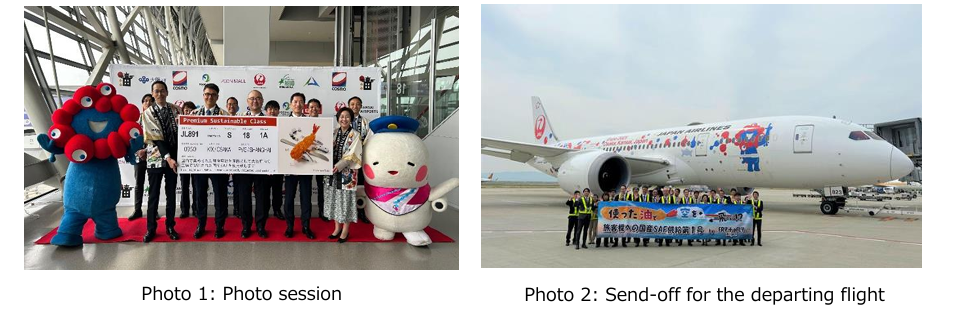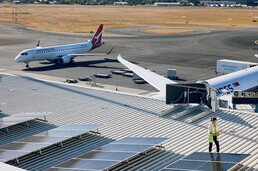
First passenger flight from KIX supplied with commercialised domestic SAF
- 2025-05-01
JGC Holdings Corporation (Representative Director, Chairman and CEO, Masayuki Sato, “JGC HD”), Japan Airlines Co., Ltd. (President & Group CEO, Mitsuko Tottori, “JAL”), and Kansai Airports (Representative Director and CEO, Yoshiyuki Yamaya, “KAP”) have been advancing various initiatives as part of the Fry to Fly Project, aiming to realize a world where airplanes fly using Sustainable Aviation Fuel (SAF) produced domestically from waste cooking oil collected in Japan.
On May 1, 2025, domestically mass-produced SAF was supplied for the first time to a passenger flight, JAL's flight JL891 (Kansai to Shanghai Pudong) at Kansai International Airport (KIX).
The SAF supplied by Saffaire Sky Energy LLC is certified for its 'environmental value,' having obtained ISCC CORSIA certification (an international certification for sustainable products) as an SAF manufacturer for the first time in Japan. It is mass-produced at its manufacturing facility located in Cosmo Oil's Sakai Refinery (Sakai City, Osaka Prefecture). With the successful supply to a passenger flight, the domestic SAF supply chain has officially commenced operations.
In the aviation industry, the International Civil Aviation Organization (ICAO) has set a goal to reduce
emissions from international flights by 15% compared to 2019 levels starting from 2024 and to achieve net-zero emissions by 2050. Amid such backdrop, efforts have been made, such as the completion of Japan's first large-scale SAF production facility in December 2024, and the start of stable domestic production and supply of SAF in April 2025. Today marks a significant milestone as we successfully operated the first passenger flight from KIX with domestically produced SAF made from waste cooking oil collected through the Fry to Fly Project. The implementation of a supply chain that enables the continuous production and supply of SAF in Japan plays a crucial role in reducing CO2 emissions.
Photos from the commemorative event at KIX.

Moving forward, to accelerate the decarbonization of the aviation industry, the Fry to Fly Project* will
continue to deepen collaboration between companies and local governments, enhance the collection of waste cooking oil, and expand the use of SAF in Japan.
*Fry to Fly Project
The Fry to Fly Project aims to realize a world where aircraft fly using SAF made from domestic resources, specifically waste cooking oil generated by households and businesses. A large amount of waste cooking oil is required to supply SAF on a wider scale, but much of the waste cooking oil from households is discarded, and over 100,000 tons of collected waste oil are exported annually.
To address these issues, participating companies, local governments, and organizations that support the project's purpose started to collaborate to propel the collection of waste cooking oil from households and businesses. Additionally, educational activities are conducted to raise awareness about the collection of waste cooking oil for SAF in cooperation with local governments. The project aims to create opportunities for active participation in promoting resource circulation towards decarbonization within Japan. Initially starting with 29 members, the project has now expanded to over 200 companies and local governments.







